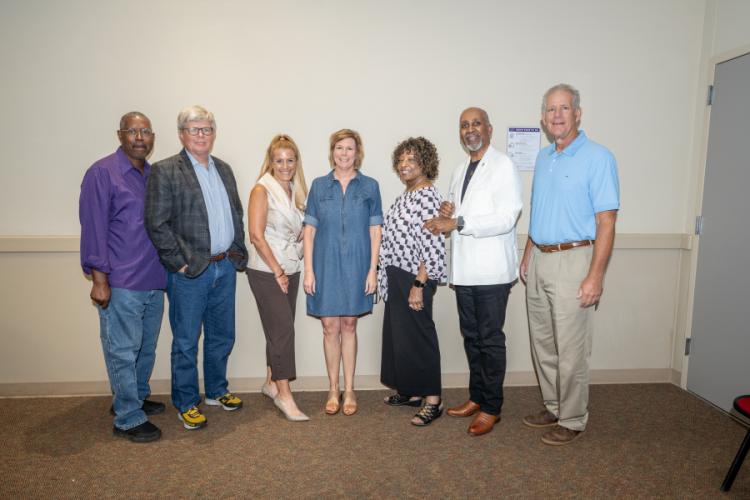NACOGDOCHES, Texas — Twenty years after graduating from Stephen F. Austin State University with their Doctor of Education in educational leadership, the class of 2003 returned to campus in June to celebrate their longstanding friendship and meet with current students in the same program.
Alumni Drs. Aaron Covington, Edgar A. Dillard, Kevin L. Dyes, Nici Esch, J. Leonard Wright and Sandra Wright have maintained their strong connection that began at SFA more than 20 years ago. They are the program’s first cohort to facilitate this kind of reunion after reaching out to Dr. Stacy Hendricks, associate dean of student services and advising for SFA’s James I. Perkins College of Education, to set up a visit to the campus.
Their goal was to reconnect with former professors and each other, as well as to offer what guidance they could to current students in the program — much of which focused on the many benefits of the program’s cohort model.
“One of the things we were very committed to as a group was to start and finish this program together,” Esch told the group of doctoral students gathered in SFA’s Human Services Building in June. “If one of us slacked, we would call them out. We pushed each other. We all had other lives and we all knew we had to get this done. We were literally pulling each other to the finish line.”
Since its inception, SFA’s doctoral degree in educational leadership has been a terminal degree offered in a cohort setting where a group of students begin the program and continue in the same collection of classes throughout the duration of that program.
According to Hendricks, the cohort model offers students support from others, teamwork, networking and differing perspectives. Through this model, students can collaborate with a diverse group of colleagues for a more enriching cooperative learning experience.
“The 2003 cohort was fortunate to have everyone graduate the same semester, but that is not always the case with the dissertation as the end product,” Hendricks said. “Once students begin the dissertation writing process, the completion of dissertation timeline for students may vary due to a variety of circumstances.”
Despite having full-time jobs or families while in the program, which is now entirely online, the class of 2003 cohort fulfilled their goal of graduating together.
“The cohort model is the way you do it,” Dillard said. “This is the only way you get it done, and so we were very fortunate to have that mutual understanding in our group.”
The spirit of the cohort model continued even after their graduation through professional and personal relationships over the years. Whether they’re supporting one another during promotions or retirements, the cohort has kept in contact through group chats and occasional reunions.
“We’ve been there for each other,” Sandra Wright said. “We’ve always had a way to let everyone know what’s going on.”
The class of 2003 enjoyed their reunion and on-campus lunch with the current class of educational leadership doctoral students, including Lacey Folsom, Jennifer Goddard, Herbert Midgley and Claire Murphy.
“We loved meeting current students and told them to cherish the relationships you build,” Esch said. “Keep them very special and keep them close to your heart.”
To learn more about SFA’s Doctor of Education in educational leadership, visit sfasu.edu/humanservices.
 Axe ’Em, Jacks!
Axe ’Em, Jacks!
